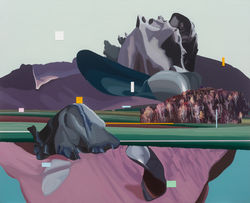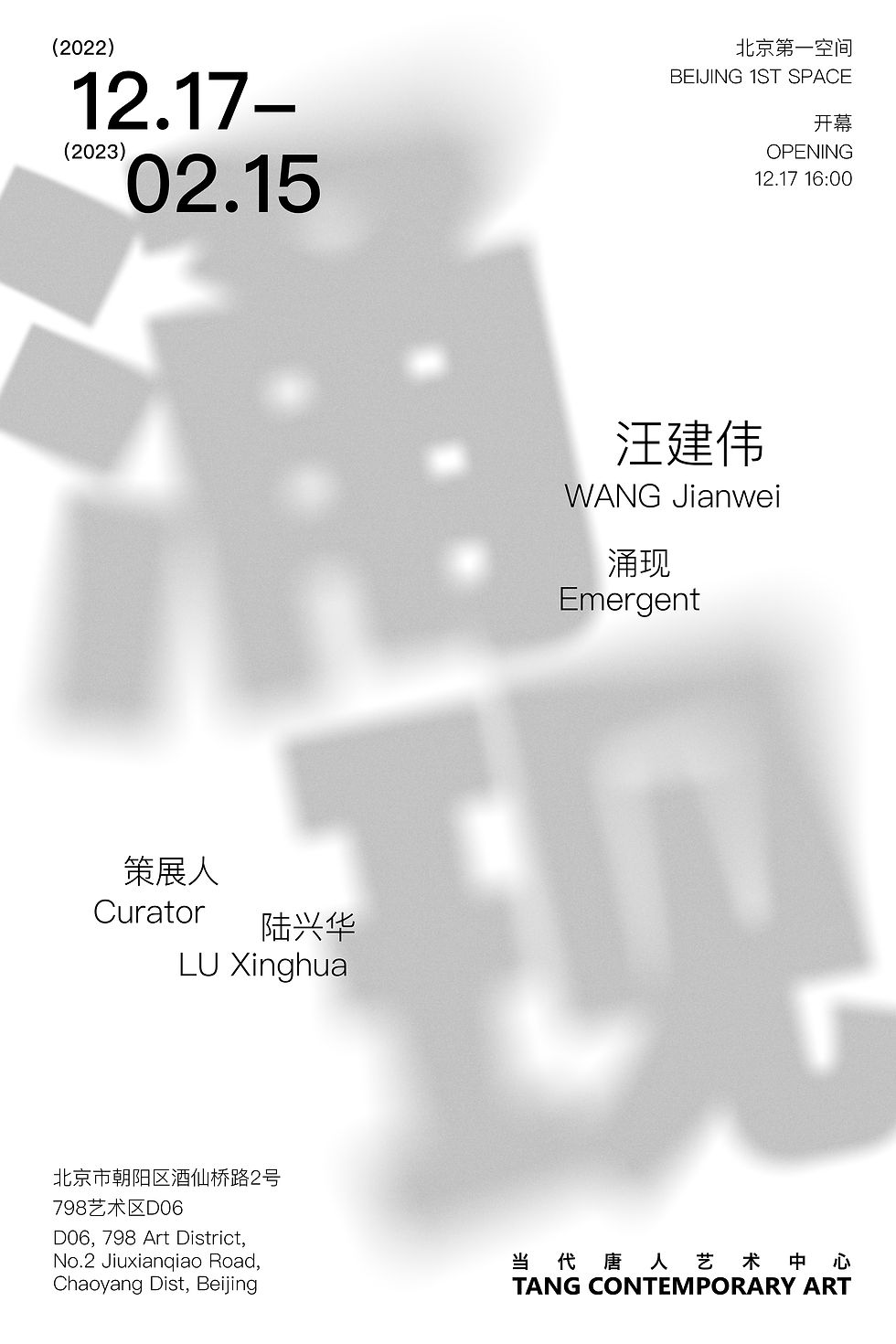Tang Contemporary Art is pleased to announce "Emergent", a solo exhibition by artist Wang Jianwei, starting on December 17, 2022, at Beijing 1st Space. Curated by Lu Xinghua, “Emergent” focus on the theme of climatic variation.
Written before Emergent: WANG Jianwei Solo Exhibition at Tang Contemporary Art — A "Flat" Artistic Response to Climate Change Lu Xinghua (Philosopher, Curator)
What do artists do to deal with climate change? How are their reactions represented in their everyday creations? Should they express concern within them? Certainly. What about methodology? Should it be aimed at encouraging public discourse on global impacts? Without question. What comes after that, though?
How will artists find themselves their intrinsic midpoints in the universe (hosts of their own universal spaces) in order to provide their contemporaries and themselves with shelter in the ups and downs of Anthropocene during the throes of climate change? How can they inspire other people to produce new sensibilities and aesthetics of Anthropocene and cloud platforms in order to comfort and heal their humanity? How will they finish their commitment by means of contemporary art?
Wang Jianwei has taken the initiative to put his 40 years of painting practice into the giant symbolic uncertainty of climate change, letting his technique accept the challenge outside the frame to the greatest degree possible and seeking adventure deep down within the expanses of time and earth history. He is like a gambler, rushing into the engineering project of contemporary art under climate change along with all his wealth of methodology. He has been pushed into being a scientist, a philosopher, and an artist at the same time in order to shoulder the weight of the Anthropocene. Paleontology, atmospheric science, geology, landscapes, discursive positivism, painting methodology, image-making procedures, time, space, concepts, toolboxes, in-park firefighting, artwork rhythms, the pandemic, rumors of forced relocation, etc. He flattens all of the above onto the same plane.
Such flatness implies that the whole cannot configure all its parts. In a flat state, the identity of totality does not transcend the parts but is embedded within each. For example, individual parts of the city can also be level with the city, with the city being an identity of each of its parts. Humans at every point are level with their innumerable inner organisms. The mitochondria in each cell are also equal to the person; the ontological plane of a cell is similarly equal to the ontological plane of a human.
As the theme of the group of flat paintings and sculptures that are about to be presented for the first time at Tang Contemporary Art Beijing, "Emergent" refers to brand-new things being produced when the whole is squashed into the same position as its parts and then interacts with every facet. The content of his work is also considered to "emerge" in this way. Wang Jianwei treats his art objects discursively, using a flat strategy to force viewers to imagine how they will encounter other species and objects in the biosphere. Training the human species to be ethically resilient allows people to face the difficulties of the Anthropocene and its inherent humiliation in terms of status degradation with enough dignified composure. This flat methodology of ethical resilience will become a life preserver for human beings under climate change.
With the artist having studied the American philosopher Graham Harman for the past decade, this series of works presents the influence of his speculative realism and object-oriented ontology on Wang Jianwei's art. The flat ontology that rules Wang's works has also been considered the basic logical practice in the Actor-Network Theory of the Anthropocene by another philosopher, Bruno Latour, who believed that human beings and all non-human objects, even signs, tools, and virtual characters, could be equal action pieces and that their importance would depend on the real-time weight of a new member joining this network. Humans' position within climate change can be understood with the help of flat ontology, and in Wang!s recent solo exhibition Treading in Sludge at Madein Gallery, it has been explained that through the data packet of painting and sculpture methodologies, humans could understand their own fates in the depths of history and geological time and then play an open-world game with a new set of speculative eyes. As expected in this case, his exhibition will be a laboratory, a classroom, and also a theater.
Flat painting or sculpture are art forms that have nothing to do with humans, hearts, feelings, or personal spirits. From the perspective of flat ontology, it is our heart that makes nature, nations, armies, art institutions, and economy possible. It is the curiosity of the heart that creates our society and fills in the blanks of our lives. However, the heart can be so gullible that easily misunderstand its "objects." For instance, our heart may begin to configure and express emotions with all its effort when facing the seas while it has not known anything about what seas are, what their structures or components are, or what they have experienced. Painting out of personal spirit is thus a production of nonsense, yet painting and sculpture are supposed to calibrate the inevitable misunderstandings of our hearts. Wang Jianwei's flat methodology shuts down such lyricism and also his spiritual history to prevent turning art or natural history into pure fantasy. This methodology in turn strictly regulates his new creation and the audience's behavior, making viewers understand their fates in the wheels of climate change and become encouraged to dance with destiny by observing these flat works.
The ultimate goal of flat methodology is to make flat interaction between the objects emerge in the works. Likewise, under the Anthropocene, our great endeavor on this artificial planet is expected to encounter the emergence of a new nature and new humanities.
In the end, let us celebrate together, for Wang Jianwei has presented us a pleasant surprise once again in this long journey that is his art career. We warmly welcome all in the art world to come view and appreciate this stunning exhibition at the Beijing First Space of Tang Contemporary Art.
 Emergent No.16Oil on canvas 188 × 250 cm 2022 |  Emergent No.13Oil on canvas 130 × 160 cm 2021 |  Emergent No.11Oil on canvas 200 × 150 cm 2022 |
|---|---|---|
 Emergent No.12Oil on canvas 150 × 115 cm 2022 |  Emergent No.9Oil on canvas 250 × 187 cm 2022 |  Emergent No.6Mixed media-Cast aluminum, fluorocarbon paint L125 × W55 × H50 cm 2022 |
 Emergent No.2Mixed media-Stainless steel, wood, fluorocarbon paint L160 × W135 × H90 cm 2020 |  Emergent No.1Mixed media-Stainless steel, wood, fluorocarbon paint L200 × W100 �× H140 cm 2021 |  Emergent No.5Mixed media-Cast aluminum, fluorocarbon paint L130 × W75 × H105 cm 2022 |
 Emergent No.4Mixed media-Stainless steel, wood, fluorocarbon paint L150 × W130 × H160 cm 2019 |
Artist

Wang Jianwei
Wang Jianwei, born in 1958 in Sichuan province, China, now is living and working in Beijing.
Since the 1990s, he has been researching the influence of multiple sciences and cross-sectors' knowledge on contemporary art. He borrows and engages the methodologies of different disciplines in order to develop a new language for art. With this cross-fertilized knowledge, he launches philosophical inquiries to practice a cross-sector method to view the reality. Simultaneously, he transforms these visions into arts forms, engaging in multiple mediums, including film, theater, multimedia, installation, painting and text etc.
Wang Jianwei has been invited to participate many film and theater festivals, arts exhibitions and important academic events both within China and internationally. In 2008, he has been awarded by Foundation for Contemporary Art (FCA) the "Grant Recipient".



